Production at Iggesund Paperboard’s mill in the UK is now fully operational again. At the beginning of March the board machine was shut down for a rebuild, in which its oldest part, the press section, was replaced with cutting-edge technology. The rebuild will increase the machine’s capacity by 20,000 annual tonnes from 200,000 up to 220,000 and will also enable further quality improvements in the future.
“These are the immediate effects but in the longer term the new press section means we have a more advanced platform for our continued development work, which will be decisive for our future competitiveness,” comments Bengt Löfroth, technical strategy officer at Workington Mill.
A rebuild of a huge paper machine is a race against time. The high capital costs mean that the loss of every hour’s earnings is significant. The rebuild must therefore be planned down to the smallest detail so that all the contractors know precisely what they must do and when. Planning for a stoppage like that at Workington starts more than a year in advance.
After the rebuild is finished, uncertainties still remain: will the machine restart and how quickly can production get back to the quality that existed prior to the stoppage?
“Looking back, this was a superb job by both our own staff and the contractors involved,” says Ulf Löfgren, Managing Director of Workington Mill. “They worked night and day to give us the best possible results.”
Prior to this year’s rebuild, Iggesund Paperboard had invested more than £200 million in Workington Mill since the turn of the millennium. Today Workington is the only remaining paperboard mill using virgin fibre in the British Isles. The mill has a high technological standard and is a good demonstration of paperboard’s environmental advantages over other packaging materials. In 2013 the mill switched overnight from using fossil natural gas to using biomass as its energy source. The change meant an instant reduction of the mill’s fossil carbon emissions by 190,000 tonnes per year, the equivalent of taking 65,000 cars off the road. The investment that made this possible cost £108 million.
The new press section, combined with other measures implemented during the rebuild period, also increases the mill’s energy efficiency.
“We’re constantly looking for ways to become more efficient and save on the resources we use,” Bengt Löfroth says. “What we’ve just done now means that we will reduce our energy consumption by almost 10 per cent – which is an achievement in itself.”
Incada is the name of the folding box board produced at Workington. It is made of virgin fibre and is built to have a stiffness that makes it a preferred packaging material among companies wanting to give their products good protection with low weight while still getting the best possible print results on their packaging.










